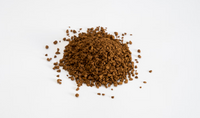Coffee is the go-to beverage for many of us, whether it's to kickstart our day, get through an afternoon slump, or simply enjoy a hot and comforting drink. But while coffee is a great source of energy and enjoyment, it's also surrounded by concerns about its caffeine content and potential negative impacts on our health.
So, how much coffee is too much? We spoke to Emilia Thompson, a nutritionist with a PhD, to get her expert advice on optimal coffee consumption and the maximum caffeine intake.
First things first, there's no specific ingredient in coffee that is bad for us, Emilia explains. Rather, it's exceeding our usual amount of caffeine that may cause some short-term disturbances, such as increased blood pressure or anxiety. However, these effects are usually found in those who are non-habituated to caffeine or those who drink very high doses, over 500mg or five cups of coffee.
In fact, studies have shown that coffee can have numerous health benefits, including a reduction in type 2 diabetes, Alzheimer's, and heart disease. A 2021 review published in the American Heart Association's journal Circulation found that higher coffee intake was associated with a reduced risk of heart failure. Moreover, coffee drinkers can experience improved motor control, which could be helpful in workouts.
The European Food Standards Agency recommends a maximum caffeine intake of 400mg per day, which is roughly equivalent to four cups of coffee. However, it's best to account for your individual needs, and a rough dose of 3-5mg/kg body weight works out at around 200-350mg or two-three cups of coffee a day for a 70kg person.
But before you grab that second or third cup, remember that caffeine tolerance varies from person to person, and it's important to pay attention to how coffee affects you personally. If you're a habitual tea drinker or you consume other caffeinated beverages like energy drinks, you'll need to reduce your coffee intake to account for that.
Timing is also crucial. Emilia advises introducing coffee and increasing it in small increments to avoid giving your body a sudden shock of caffeine. And morning time is best, ideally avoiding caffeine within 10 hours of your usual bedtime. A single dose of 100mg of caffeine, roughly one cup of coffee, may increase sleep latency and reduce sleep duration, particularly when consumed close to bedtime.
If you feel any negative impacts of coffee, such as disturbed sleep or increased anxiety, try reducing your caffeine intake. Ultimately, there's no gold-standard test for this, and it's somewhat subjective.
In summary, coffee can support both cognitive and physical performance, and it tastes delicious. But as with all things, moderation is key. If you find yourself relying on coffee to get through the day, it's best to speak with a doctor about what your body is trying to tell you, rather than masking it with caffeine.
So go ahead, brew that perfect cup of coffee and enjoy it mindfully!


